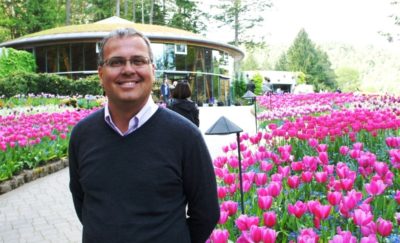 Professor in the fields of Visitor Studies, Museum Education and Science Education, The University of British Columbia
Professor in the fields of Visitor Studies, Museum Education and Science Education, The University of British Columbia
Personal and professional relationships yield such rich and fruitful benefits that are felt and realized in one’s career years after that Fellowship concludes.
Professor Anderson was awarded a Japan Foundation Fellowship to study the nature and characteristics of visitors’ long-term memories. The six months he spent in Kobe, Hyogo Prefecture, in 2009 seem to have left indelible marks on his own memories.
My Fellowship investigated the long-term memories of visitors who experienced the Aichi 2005 World Exposition, Japan (Expo 2005), as a means of understanding the long-term impact of these international events that connect people and cultures globally. The primary goal of the Fellowship was to conduct collaborative research that will generate new understandings and new knowledge about the nature and characteristics of visitors’ long-term memories through the cases of their personal experiences from this Japanese World Exposition.
The Fellowship produced highly beneficial outcomes including five journal article directly emergent from the research study. However, the greatest impact was the springboard effect of the collegial relationships that were developed and flourished in the years that followed, including expanded professional networks with Japanese scholars and museums; several Canadian Government and JSPS research grants with Japanese Co-Investigators and collaborators; and multiple invitations for keynote addresses to scholarly forums world-wide. The positive affects of my Fellowship are still felt and enjoyed today in my scholarship and academic career.
The Fellowship opened doors for Professor Anderson, but more than those career opportunities, his best memories are “of the Japanese people with whom I developed strong and endearing relationships, which continue to this day.”
My Fellowship was instrumental in advancing my academic career and scholarship in many ways. Unquestionably, the Fellowship increased my research productivity directly through the 2009 study, but also in the years that followed through my expanded network of research collaborations which also yielded very fruitful results and many publications. The Fellowship was key to enhancing my scholarship and promotion through the academic ranks to Full Professor.
There have been many new projects that have spring-boarded from my Fellowship – Including: “Comparison of long-term memories of visitors’ experiences between Aichi Expo (2005) and Osaka Expo (1970)”; “Understanding visitors’ long-term memories through museum experiences and nostalgic responses”; and, “Japanese university students’ restorative experiences in gardens and other sites.”
I feel it is important for incoming and new Japan Foundation Fellows to appreciation the importance of relationship-building throughout their time in Japan – Personal and professional relationships yield such rich and fruitful benefits that are felt and realized in one’s career years after that Fellowship concludes.

 Professor in the fields of Visitor Studies, Museum Education and Science Education, The University of British Columbia
Professor in the fields of Visitor Studies, Museum Education and Science Education, The University of British Columbia